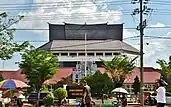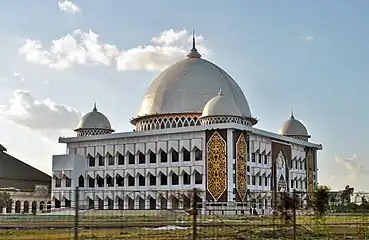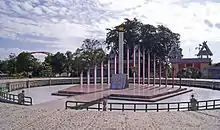Palangka Raya
Palangka Raya is the capital and largest city of the Indonesian province of Central Kalimantan. The city is situated between the Kahayan and the Sabangau rivers on the island of Borneo. As of the 2020 census, the city has a population of 293,500;[4] the official estimate as at mid 2022 was 305,907 (comprising 155,496 males and 150,411 females).[1] Palangka Raya is the largest city by land area in Indonesia (approximately four times the size of Jakarta). Most of the area is forested (particularly in the northern districts of Rakumpit and Bukit Batu) including protected forests, nature conservation areas, and Tangkiling Forest).[5] It also has the highest Human Development Index rating of any city in Kalimantan.[6][7]
Palangka Raya | |
|---|---|
| City of Palangka Raya Kota Palangka Raya | |
Clockwise from top: Central Kalimantan Parliament Building, Aquarius Boutique Hotel, Kahayan Bridge, Bundaran Burung (Bird Roundabout), Sukarno Monument and Palangka Raya Islamic Center. | |
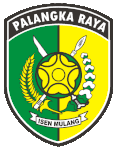 Coat of arms | |
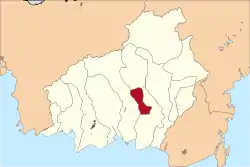 Location within Central Kalimantan | |
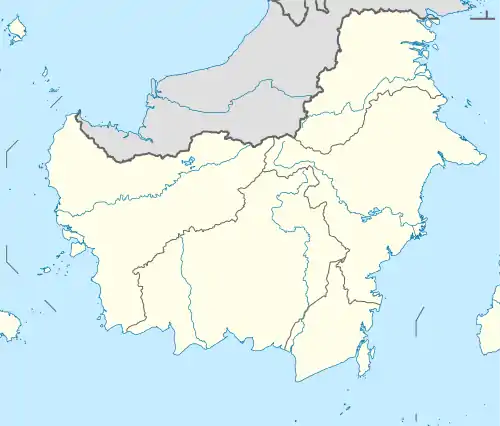 Palangka Raya Location in Kalimantan and Indonesia 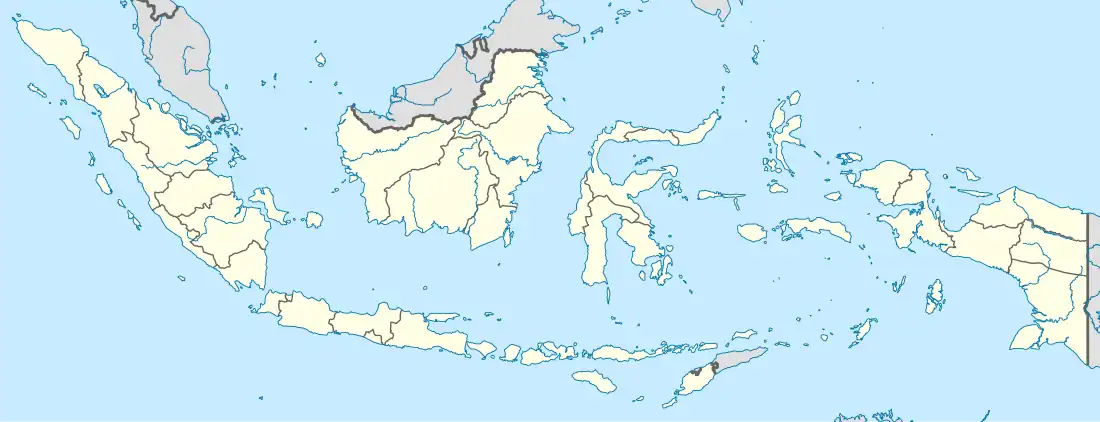 Palangka Raya Palangka Raya (Indonesia) | |
| Coordinates: 2°12′36″S 113°55′12″E | |
| Country | |
| Region | Kalimantan |
| Province | |
| Founded | 17 July 1957 |
| Government | |
| • Mayor | Fairid Naparin |
| • Vice Mayor | Umi Mastikah |
| Area | |
| • Total | 2,853.12 km2 (1,101.60 sq mi) |
| Elevation | 5 m (16 ft) |
| Population (mid 2022 estimate[1]) | |
| • Total | 305,907 |
| • Density | 110/km2 (280/sq mi) |
| Demographics | |
| • Religion[2] | Islam 69.31% Protestant 26.51% Catholic 1.88% Hindu 1.59% Kaharingan 0.53% Buddhist 0.17% Confucian 0.004% |
| Time zone | UTC+7 (Western Indonesia Time) |
| Area code | (+62) 536 |
| HDI (2022) | |
| Website | palangkaraya.go.id |
The city is the center of economic, governance, and education of Central Kalimantan province. It is a relatively new city, founded from a small Dayak village of Pahandut in 1957. The city was planned from the scratch and the construction was assisted by the Soviet military due to Sukarno's relation to Eastern Bloc at the time. Despite relatively developed infrastructure and high Human Development Index rating, the city suffers from environmental problems such as haze, forest fires, and floods.[8]
Etymology
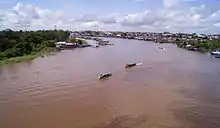
The name Palangka Raya is a combination of two words from the Dayak Ngaju and Sanskrit languages. Palangka (Dayak), meaning sacred site, and raya (Sanskrit), meaning vast; therefore, Palangka Raya means a vast sacred site. The city stands on the site of a small Dayak village called Pahandut that was surrounded by rainforest.[9][10]
According to a local legend, Bayuh and Kambang, a married Dayak couple, founded the village because the surrounding region was not suitable for building a house, as its soil was made up of peat and swamps. Over time, the village grew into a small Dayak outpost with its surroundings being used for farming and as a small plantation. At first, it was believed that the name of the village was Dukuh Bayuh. Dukuh Bayuh was thought to be derived from Eka Badukuh, meaning "place to settle" in Dayak (with daily usage called Dukuh ain Bayuh, shortened Dukuh Bayuh). Pahandut on the other hand, according to local stories, was a respected elder and cultural figure from the village. He was often called Bapa Handut, which literally means Mr. Handut. Handut passed away because of an illness, and to respect his death as an important figure from the village, it was named Pahandut.[11]
History
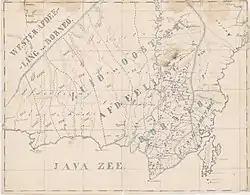
Colonial Era
According to documents from the Dutch East Indies, Pahandut village's existence was discovered by Zacharias Hartman, a Dutch explorer, on his journey around Kahayan and Kapuas River in 1823. This conflicts with the statements that claim the village was previously known under the Sultanate of Banjar, which became a Dutch protectorate under an agreement with Sultan Tahmidullah II in 1787. The region was leased to the Dutch East Indies by Sultan Sulaiman in 1817, and was ceded by Sultan Adam of Banjar under a contract signed on 4 May 1826, written in Dutch on second point which reads in English as:[12][13]
The Fifth article of the contract is hereby declared null and void and shall be replaced by the following, His Highness the Sultan Sleman, relinquishes in full ownership to his entire island of Tatas and the Kween, to the left bank of the Antasjan Kecil, Lewai, Jelai, Sintang, Takjanjauw, Pagatan, and the island of Pulau Laut, Kotta Ringin, Passir, Kute, Barouw and all their dependencies. His Highness furthermore cedes one half of the lands, Pamboean, Mandawi, Sampit, the large and small Dajak, the Becompaij, and Doesoen. On the other hand, the Government will cede half of the lands that the Government has taken possession of at the request of His Highness, and which have belonged to Mr Hare. In particular Molucco, Laut, the Kuroe, Leanangan and all their dependencies up to Tanjong Selatan and to the boundaries of Pagatan and Pasir.
It was integrated into Zuid Ooster Afdeeling in accordance with Bêsluit van den Minister van Staat, Gouverneur-Generaal van Nederlandsch-Indie No. 8 , 27 August 1849. ("Decision of the Minister of State, Governor-General of Netherlands-India No. 8) [14] In 1898, it became part of Afdeeling Dajaklandeen in accordance with Staatblad 1898 No. 178. (Official Gazette 1898 No. 178)[15][16] Dutch rule remained weak in this region and several revolts from native rulers took place, such as under Raden Djaija and Pambakal Sulil in 1849.[17][16] The region saw a conflict over succession and against Dutch rule called the Banjarmasin War. There has been debate about whether the fighting constituted one war or two, with the potential auxiliary war called the "Barito War".[18] The village of Pahandut was also used by German missionaries as an outpost for the region around the Kahayan river. In the Tumbang Anoi Peacemaking Agreement between Dayak tribes in 1894 to end the practice of headhunting, it was noted that Pahandut village consisted of eight longhouses and was inhabited by around 40 families.[19]
Later, during Indonesian National Revolution, there were armed clash within the region between Indonesian nationalists under unit TNI/MN 1001 and Royal Netherlands East Indies Army on 17 January 1946.[18]
Establishment
The province of Central Kalimantan was established on 23 May 1957. At first, the capital for the Central Kalimantan province was not agreed and it was debated where it should be located. R.T.A. Milono, acting governor of Central Kalimantan, discussed the matter with several native organizations and cultural figures from the region. This however evoked tension from several native tribes and organizations that each wanted their own region to be chosen as capital. On 23 January 1957, a committee to discuss the matter was created, consisting mostly of Dayak cultural figures, in addition to military figures such as Tjilik Riwut and Dutch-descendant architect D.A.W. Van Der Pijl who also later designed the then-proposed new capital of South Kalimantan, Banjarbaru. From the committee's meeting, it was decided that Pahandut village would be the capital to avoid cultural association within tribes in the province, hence avoiding conflicts.[18] At the time, the village only had an estimated population of around 900.[20]
The first pillar in the development of Palangka Raya City was erected by Sukarno, the President of the Republic of Indonesia, on 17 July 1957, marking the inauguration of the monument to the provincial capital of Central Kalimantan in Pahandut.[21] Then, in accordance with Law No. 21 of 1958, Pahandut was renamed to Palangka Raya City, maintaining its status as the provincial seat.[22] The construction of the city was directly led by Tjilik Riwut, whom by then had become governor of the Central Kalimantan province. The city was claimed by him to be "free from colonial legacies". At first however, he was rumoured to be insane by residents of the province for trying to build a city on top of nothingness.[20] It was officially made the capital of Central Kalimantan on 1 January 1960, relocated from temporary seat in Banjarmasin. By late 1962, the city had by this point largely finished construction of basic infrastructure such as schools, government offices, inner city roads, and residential areas, with an estimated 500 buildings having been constructed.[23]
On 23 July 1965, it gained official city status (kotapraja) and formed its own municipal government.[23] The city was constructed with the assistance of Soviet military, especially regarding road construction due to the terrain of the region - dominated by swamps and peat.[24] The road which today is named Jl. Tjilik Riwut, was previously planned to be constructed from the city to Pangkalan Bun and Sampit. This however, was never realized due to 30 September Movement, coup d'état against Sukarno, and subsequent communist purge that followed.[25] Many local workers resigned and abandoned their work due to fear of being accused as communist and the road construction stopped at the town of Tangkiling.[8]
Recent history
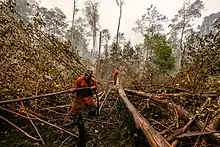
Surrounded by forests and peat land, the city can be heavily affected by haze in the dry season, notably in 2015 and 2019. In 2015, the haze made the sky look yellow and affected road traffic.[26][27]
In 2019, the haze caused several people to evacuate the city.[28][29] Forest fires and haze have been annual threats to the city and the city government formed a special agency to deal with forest fires and haze.[30][31] The city government constructed 23 canals and three retention basins around the city to deal with threat of forest fires in 2019.[32][33]
The city was a candidate to become the new Indonesian capital until the 2019 announcement that the new capital will be in Penajam North Paser Regency and Kutai Kartanegara Regency, both in East Kalimantan.[34][35][36]
Geography
Palangka Raya borders Gunung Mas Regency to the north, Katingan Regency to the west, and Pulang Pisau Regency to the south and east. The area's soil consists mostly of peat and alluvium in its southern part and podzol on the northern part of the city. Overall, podzol soil dominates the city soil with 218,486 out of 285,349 hectares of city's landscape. Most of the city's topography is flat, with a general slope of less than 40 percent.[37] Palangka Raya is mostly located around 35 meters above sea level.[38][39]
10,105.34 hectares of land in the city is designated as protected forest, while 90,722.15 hectares are production forest. In addition, there are also 63,816.40 hectares of national park, 1,771.13 hectares of nature reserve, and 726.20 hectares of preserved nature.[37]
Climate
Palangka Raya has a tropical rainforest climate (Af) with heavy rainfall year-round. According to Meteorology, Climatology, and Geophysical Agency, average temperature in Palangka Raya is 27.28 °C (81.10 °F) , with minimum temperature 21.4 °C (70.5 °F), and highest temperature 35.2 °C (95.4 °F). Moisture is between 65 – 95% with yearly average of 82.89%. Wind usually flows between 2 and 22 knots, with yearly average of 5.3 knots. Increase of wind speed is expected in August and November.[37]
| Climate data for Palangka Raya (Tjilik Riwut Airport, 1991–2020 normals) | |||||||||||||
|---|---|---|---|---|---|---|---|---|---|---|---|---|---|
| Month | Jan | Feb | Mar | Apr | May | Jun | Jul | Aug | Sep | Oct | Nov | Dec | Year |
| Average high °C (°F) | 32.3 (90.1) |
32.4 (90.3) |
32.5 (90.5) |
32.3 (90.1) |
32.8 (91.0) |
32.5 (90.5) |
32.4 (90.3) |
32.7 (90.9) |
32.8 (91.0) |
32.8 (91.0) |
32.6 (90.7) |
32.4 (90.3) |
32.5 (90.5) |
| Daily mean °C (°F) | 26.8 (80.2) |
26.9 (80.4) |
27.0 (80.6) |
26.9 (80.4) |
27.4 (81.3) |
27.0 (80.6) |
26.7 (80.1) |
26.8 (80.2) |
27.0 (80.6) |
27.1 (80.8) |
27.0 (80.6) |
26.9 (80.4) |
27.0 (80.6) |
| Average low °C (°F) | 23.2 (73.8) |
23.3 (73.9) |
23.4 (74.1) |
23.8 (74.8) |
23.8 (74.8) |
23.3 (73.9) |
22.6 (72.7) |
22.3 (72.1) |
22.7 (72.9) |
23.2 (73.8) |
23.4 (74.1) |
23.3 (73.9) |
23.2 (73.8) |
| Average precipitation mm (inches) | 296.2 (11.66) |
254.9 (10.04) |
332.0 (13.07) |
312.0 (12.28) |
214.7 (8.45) |
166.8 (6.57) |
104.4 (4.11) |
86.8 (3.42) |
117.7 (4.63) |
193.9 (7.63) |
318.1 (12.52) |
320.7 (12.63) |
2,718.2 (107.02) |
| Average precipitation days (≥ 1.0 mm) | 19.9 | 16.6 | 19.8 | 21.3 | 15.5 | 13.5 | 10.6 | 9.2 | 10.0 | 13.4 | 19.7 | 21.7 | 191.2 |
| Mean monthly sunshine hours | 124.2 | 115.8 | 128.4 | 142.3 | 164.6 | 141.6 | 167.6 | 161.7 | 140.8 | 130.0 | 130.7 | 126.8 | 1,674.5 |
| Source: World Meteorological Organization[40] | |||||||||||||
Demographics
Population growth was 2.84% as of 2019, with sex ratio of 106 males per 100 females. As of 2020, the city's population is dominated by younger demographics above the age of 15, making up an estimated 222,285 people of reproductive age. There are estimated to be 199,140 Muslims, 73,641 Protestants, 5,511 Catholics, 3,453 Hindus, 485 Buddhists, 8 Confucians, and 27 followers of other religions such as folk religions.[41][39] The population of age 20 – 24 keeps increasing; this is thought to be caused by students from other regions in Central Kalimantan moving to the city to pursue higher education.[41] In addition, the city has the highest human development index and standard of living in the entire Kalimantan, making it an attractive destination for migrants.[42][43] Majority of city population are Dayak ethnic, accounts more than half of city's population. Other ethnics such as Banjar, Malay, Buginese, and Javanese also exist in the city.[44] More than half of the city population are from Jekan Raya District.[45]
Economy
Economic growth was 7% in 2019, above the national average, and inflation rate in the same year was 0.85%. Unemployment rate was 6% in 2020. The service sector is the largest contributor to city's gross regional product, contributing 28.36% of it in 2020, in contrast with neighboring regions which still rely mainly on agriculture and extraction. The next largest contributor to city's economy in 2020 was trade, with figure of 17.85%, followed by construction with 11.06%. The financial and banking sector provides around 6% of the city's economy. Agriculture, forestry, plantation, and fishery all combined contributed to 2.45% of the city's economy in 2019. Crop yields decreased rapidly from year-on-year; production of red chili dropped from 2,864 tons in 2018 to just more than 200 tons in 2020. Fish catch also decreased by 19.8% from 2018 to 2019. Tourism is a small but growing sector, with 389,235 domestic tourists and 3,865 foreign tourists visiting the city in 2019.[41][39] The city government owns 2.47% of the shares of Central Kalimantan Bank together with provincial government.[46][47]
There are 56,430 small and medium enterprises in 2017, from which 72% are on trade, restaurant, and hotel sector. On the same year, there are more than 250 registered cooperatives in the city.[48]
Governance
Administrative districts
Prior to decentralization in 2001, Palangka Raya had two administrative districts, Pahandut and Bukit Batu. As of 2020, Palangka Raya consists of five administrative districts, tabulated below with their areas and population totals from the 2010 Census[49] and from the 2020 Census,[4] together with the official estimates as at mid 2022.[1]
| Name of District (kecamatan) | Area in km2 | Pop'n Census 2010 | Pop'n Census 2020 | Pop'n Estimate mid 2022 |
|---|---|---|---|---|
| Pahandut District | 199.73 | 77,211 | 97,100 | 100,029 |
| Sabangau District | 640.73 | 14,306 | 24,100 | 26,219 |
| Jekan Raya District | 387.53 | 114,559 | 154,400 | 161,249 |
| Bukit Batu District | 603.14 | 11,932 | 14,000 | 14,255 |
| Rakumpit District | 1,101.99 | 2,954 | 4,000 | 4,155 |
| Totals | 2,853.12 | 220,962 | 293,500 | 305,907 |
Local government
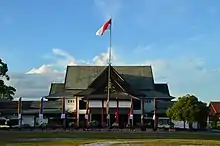
As with all Indonesian cities, it is a second-level administrative division run by a mayor and a vice mayor together with the city parliament, and it is equivalent to a regency.[50] Executive power is vested in the mayor and vice mayor, while legislative duties are vested in the local parliament. The mayor, vice mayor, and parliament members are directly elected by the people of the city in an election.[51] Heads of districts are appointed by the mayor on the recommendation of the city secretary.[52][53]
Politics
Palangka Raya is part of 1st Central Kalimantan electoral district in provincial level, together with Katingan Regency and Gunung Mas Regency have representatives of 10 out of 45 in provincial parliament. In city level, Palangka Raya is divided into three electoral districts. City parliament in total has 30 representatives that are democratically elected by people of the city in an election. Jekan Raya District is divided into two in electoral district distribution, with Jekan Raya A consist of Bukit Tunggal and Petuk Katimpun Subdistrict, and Jekan Raya B consist of Menteng and Palangka Subdistrict. Last election was in 2019 and the next one would be in 2024.[54] As Palangka Raya is also provincial capital, it also has governor office and provincial parliament of Central Kalimantan located in the city.
| Electoral District | Region | Representatives |
|---|---|---|
| Palangka Raya City 1st |
|
8 |
| Palangka Raya City 2nd |
|
10 |
| Palangka Raya City 3rd |
|
12 |
| Total | 30 | |
Military
The city is headquarter of Kodim 1016/Palangka Raya inside Korem 102/Panju Pujung, which was historically under Kodam XI/Tambun Bungai but currently is under Kodam XII/Tanjungpura. The unit was created on 9 December 1975 and formalized on 23 March 1976.[55] The unit has one raider battalion attached to it as of 2021, which is Raider Battalion 631st Antang Elang.[56]
Culture and entertainment
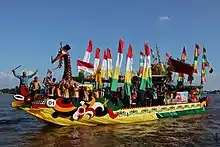
Entertainment
Several malls exist in the city, such as Palangka Raya Mall, Mega Town Square, and Barata Departement Store. Palangka Raya Mall is integrated with a hotel named Hotel Neo, which has an interior connection to the mall.[57][58] Construction of the Palangka Raya Trade Center was halted in 2019 because of a land dispute and followed by Supreme Court of Indonesia's rejection of the prosecutor's dispute.[59][60]
According to city media center, Palangka Raya has 63 city parks as of January 2020. These parks scattered in Pahandut, Jekan Raya, and Sebangau District.[61] Cultural events are often held on city park beside Kahayan Bridge.[62] The Sebangau District is home to Sebangau National Park, which was established in 2004.[63][64] The Balanga Museum has collections focused on history of Dayak people and their culture. It was built in 1973 and inaugurated in 1990.[65][66]
Festival
The preservation of Dayak culture has been promoted by the provincial government through cultural events and festivals, including the annual Isen Mulang Festival, usually held in May and June.[67][68] Other festivals were later held in 2020 with support of Ministry of Tourism, including those celebrating Malay cultures.[69]
Sport
Palangka Raya is home to Kalteng Putra F.C, which as of 2021 competes in Liga 2 after degradation from Liga 1. Its home stadium is Tuah Pahoe Stadium, located in Jekan Raya District. It was expanded in 2019 to increase stadium's capacity, in addition to facility upgrades.[70][71][72][73]
Infrastructure
Education
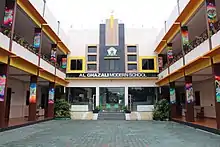
There are 134 kindergartens, 146 elementary schools, 60 junior highschools, 34 senior highschools, and 16 vocational highschools in the city. Palangka Raya is a home to number of universities and higher education institutions. University of Palangka Raya is the only public university in the city and the most notable one in the city. Other higher education institutions are Palangka Raya Christian University, Tampung Penyang Hindu Institute, Palangka Raya Muhammadiyah University, among many others.[74][38][75] School enrollment rate as of 2020 was 99%.[38]
Healthcare
Palangka Raya city has eight hospitals (including two maternity hospitals), five polyclinics, 35 puskesmas, and eight pharmacy. One of the biggest public hospital, Doris Sylvanus Regional Hospital, is owned by provincial government and has been rated by Ministry of Health as B-class hospital. Another public hospital, Palangka Raya Regional Hospital, is owned by city government, and has been classified as D-class.[76][77] Notable private hospital companies such as Siloam Hospitals also exist in the city.[78] The city also has several laboratorium facilities for many purposes, such as disease control, water and food quality check, and animal health laboratory.[79][80][81][82] Life expectancy of the city is 73.19 years, which is significantly higher than national average and the highest in the province.[39][41]
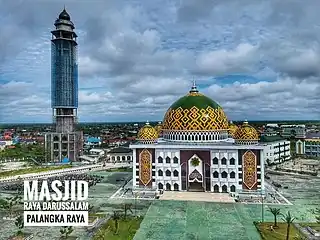
Religion
There are exactly 234 mosques, 204 churches, four Hindu temples, and five Chinese Buddhist temples in the city as of 2020.[39][41] The largest mosque in the city, according to Ministry of Religious Affairs, is Darussalam Grand Mosque Palangka Raya. It occupies 50,000 square meters of land and has maximum capacity of 10,000 people. It was built in 1984 and located in Jekan Raya District.[83]
St. Mary's Cathedral, Palangkaraya, a Catholic church, located also in Jekan Raya District. It was inaugurated on 21 March 1999.[84] Hindu temples in the city such as Pura Pitamaha, the biggest out of the four, located also in Jekan Raya District, was constructed by Indonesian Army to help local Hindu population in 1978 and now mostly used by Balinese migrants.[85][86][87][88]
Transportation
The city is served by Tjilik Riwut Airport, which is also home to an aviation school operated by Lion Air.[89] The airport served more than 8,000 aircraft and approximately 800,000 passengers in 2020.[38] Palangka Raya has total of 911.83 kilometers of road, of which 563.73 kilometers have been paved with asphalt.[38]
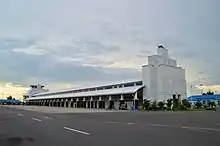
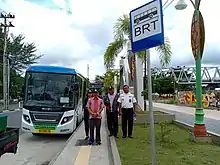
The Kahayan River bisects the city and is also used for means of transportation. The city has one port, Rambang Port, located on the river and was the primary transit point for goods up until the 1980s. Improved road conditions between Palangka Raya and other regions such as Banjarmasin and Sampit resulted in a decline in the port's use, leading to disrepair.[90][91] The city government has announced plans to revitalize the river port as a historic landmark and tourist destination.[90][92]
The city has a bus rapid transit system operated by city government, named Trans Palangkaraya. This BRT system has five lines, and was launched in early 2018. Its operation was halted during the COVID-19 pandemic until resuming on 8 November 2020.[93][94][95][96] App-based ride-hailing services such as Gojek and Grab also serve the city.[97][98] Angkots used to be important for urban transportation within the city. However, arrival of online ride-hailing services and taxis together with creation of urban bus system resulted in angkot presence's decline.[99] It is estimated as of 2020, 80% of angkot operators has been stop operating due to not being able to cover fuel cost and compete with other public transportation services.[100]
Media
According to Indonesia Press Council, there are 14 mass media companies registered in Palangka Raya, ranging from online news, printed media, to television.[101] Radio Republik Indonesia has local branch operating in Palangka Raya, as with most of other major cities in Indonesia.[102][103][104] According to Ministry of Communication and Information Technology, there were 13 unlicensed media in Palangka Raya as of 2017.[105]
References
- Badan Pusat Statistik, Jakarta, 2023, Kota Palangkaraya Dalam Angka 2023 (Katalog-BPS 1102001.6271)
- "BPS Palangka Raya". Archived from the original on 23 April 2021. Retrieved 23 April 2021.
- "P[Metode Baru] Indeks Pembangunan Manusia 2021-2022". bps.go.id. Retrieved 1 April 2023.
- Badan Pusat Statistik, Jakarta, 2021.
- "Kabupaten - Kementerian Dalam Negeri - Republik Indonesia". Archived from the original on 21 September 2013. Retrieved 20 September 2013.
- Simorangkir, Eduardo. "5 Hal Ini Hanya Anda Temukan di Palangka Raya". detikfinance (in Indonesian). Archived from the original on 7 May 2021. Retrieved 7 May 2021.
- "Badan Pusat Statistik". www.bps.go.id. Archived from the original on 28 April 2021. Retrieved 7 May 2021.
- "Palangka Raya: Jejak Rusia dan Kandidat Ibu Kota dari Masa ke Masa". apahabar.com (in Indonesian). 24 June 2019. Retrieved 26 September 2021.
- "Profil Palangka Raya" (PDF). Archived (PDF) from the original on 23 April 2021. Retrieved 23 April 2021.
- Febriyana, Wahyu. "Website Kalimantan Tengah". kalteng (in Indonesian). Archived from the original on 7 June 2021. Retrieved 30 June 2021.
- Rahman Hakim, Arif (2003). Sejarah kota Palangka Raya. Palangka Raya: Palangka Raya : Pemerintah Kota Palangka Raya. pp. 17–19. ISBN 979-97978-0-2.
- "Perjanjian-Perjanjian Antara Kesultanan Banjarmasin dengan Pemerintah Inggris, Republik Batavia, dan Hindia Belanda" (PDF). Archived (PDF) from the original on 31 August 2021. Retrieved 31 August 2021.
- Rahman Hakim, Arif (2003). Sejarah kota Palangka Raya. Palangka Raya: Pemerintah Kota Palangka Raya. pp. 15–18. ISBN 9799797802.
- Staatsblad van Nederlandisch Indië (in Dutch). 1849. Archived from the original on 31 August 2021. Retrieved 4 May 2021.
- Harmsen, Leendert Karel (1875). Bahoewa ini ilmoe boemi ija-itoe pada menjatakan perihal tanah kepoelauwan hindija di sabelah Timor jang di bawah perentah goewernemen Holanda (in Indonesian). Ogilvie. Archived from the original on 31 August 2021. Retrieved 4 May 2021.
- Almanak van Nederlandsch-Indië voor het jaar ... (in Dutch). Lands Drukkery. 1870. p. 83. Archived from the original on 31 August 2021. Retrieved 4 May 2021.
- Mayur, Gusti (1979). Perang Banjar (in Indonesian). Rapi. Archived from the original on 31 August 2021. Retrieved 4 May 2021.
- Rahman Hakim, Arif (2003). Sejarah kota Palangka Raya. Palangka Raya: Palangka Raya : Pemerintah Kota Palangka Raya. pp. 8–13. ISBN 979-97978-0-2.
- Rahman Hakim, Arif (2003). Sejarah kota Palangka Raya. Palangka Raya: Palangka Raya : Pemerintah Kota Palangka Raya. pp. 18–20. ISBN 979-97978-0-2.
- Fikrie, Muammar. "Tjilik Riwut, sang legenda Kalimantan Tengah". Lokadata.ID (in Indonesian). Retrieved 2 January 2022.
- "Tugu di Palangkaraya Ini Dibangun Soekarno saat Menggagas Rencana Ibu Kota Negara Indonesia". Kaltim Tribun News. 2017. Archived from the original on 19 October 2017. Retrieved 19 October 2017.
- "Kabupaten - Kementerian Dalam Negeri - Republik Indonesia". Archived from the original on 21 September 2013. Retrieved 20 September 2013.
- Rahman Hakim, Arif (2003). Sejarah kota Palangka Raya. Palangka Raya: Palangka Raya : Pemerintah Kota Palangka Raya. pp. 57–70. ISBN 979-97978-0-2.
- "Dari Moskow untuk Borneo". beritagar.id. 19 August 2017. Retrieved 26 September 2021.
- Handayani, Maulida Sri. "Jalan Rusia di Kalimantan Timur". tirto.id (in Indonesian). Retrieved 26 September 2021.
- "Asap Kalteng Parah". Archived from the original on 30 April 2021. Retrieved 30 April 2021.
- "Kalimantan politicians wear facemasks inside parliament as Palangkaraya suffers in silence". Mongabay Environmental News. 20 October 2015. Archived from the original on 30 April 2021. Retrieved 30 April 2021.
- "Kisah warga Palangkaraya yang terpaksa bertahan menghirup asap: 'Bisa pusing, bisa sesak'". BBC News Indonesia (in Indonesian). 17 September 2019. Archived from the original on 30 April 2021. Retrieved 30 April 2021.
- "Kabut Asap Pekat Kepung Palangka Raya". 16 September 2019. Archived from the original on 30 April 2021. Retrieved 30 April 2021.
- antaranews.com (24 April 2021). "Palangka Raya siapkan tujuh posko penanganan Karhutla". Antara News. Archived from the original on 30 April 2021. Retrieved 30 April 2021.
- nurjianti (3 March 2021). "Satgas Pengendali Karhutla Segera Dibentuk". Media Center Isen Mulang Palangka Raya (in Indonesian). Archived from the original on 30 April 2021. Retrieved 30 April 2021.
- Alfrianto (29 January 2019). "Pembuatan Sekat Kanal dalam Kesiapan Pencegahan Karhutla di Kota Palangka Raya". Pemerintah Kota Palangka Raya (in Indonesian). Archived from the original on 30 April 2021. Retrieved 30 April 2021.
- "Ini Total Sekat Kanal dan Embung di Palangka Raya". www.borneonews.co.id. Archived from the original on 31 August 2021. Retrieved 30 April 2021.
- Picheta, Rob (26 August 2019). "Indonesia will build its new capital city in Borneo as Jakarta sinks into the Java Sea". CNN. Archived from the original on 26 August 2019. Retrieved 26 August 2019.
- VIVA, PT VIVA MEDIA BARU- (30 July 2010). "Mengapa Palangkaraya Paling Pas Jadi Ibukota". www.viva.co.id. Archived from the original on 16 January 2021. Retrieved 26 February 2021.
- "Statistik Palangkaraya 2020". Archived from the original on 22 April 2021. Retrieved 22 April 2021.
- "Geografis". Pemerintah Kota Palangka Raya (in Indonesian). 3 June 2016. Archived from the original on 23 April 2021. Retrieved 22 April 2021.
- "Badan Pusat Statistik Provinsi Kalimantan Tengah". kalteng.bps.go.id. Archived from the original on 22 April 2021. Retrieved 22 April 2021.
- "BPS Kota Palangka Raya". palangkakota.bps.go.id. Archived from the original on 22 April 2021. Retrieved 22 April 2021.
- "World Meteorological Organization Climate Normals for 1991–2020". World Meteorological Organization. Retrieved 19 October 2023.
- "BPS Kota Palangka Raya". palangkakota.bps.go.id. Archived from the original on 22 April 2021. Retrieved 23 April 2021.
- "BPS Kota Palangka Raya". palangkakota.bps.go.id. Archived from the original on 30 April 2021. Retrieved 30 April 2021.
- RRI 2021, LPP. "Palangka Raya Tertinggi Indeks Pembangunan Manusia di Kalimantan". rri.co.id. Archived from the original on 30 April 2021. Retrieved 30 April 2021.
- Febriyana, Wahyu. "Keragaman Agama di Kalimantan Tengah". mmckalteng (in Indonesian). Archived from the original on 30 April 2021. Retrieved 30 April 2021.
- "Jumlah Penduduk". Pemerintah Kota Palangka Raya (in Indonesian). 3 June 2016. Archived from the original on 28 April 2021. Retrieved 1 May 2021.
- "Profil Perusahaan". www.bankkalteng.co.id. Archived from the original on 23 April 2021. Retrieved 23 April 2021.
- "Blog – BANK KALTENG BAGI DIVIDEN TAHUN BUKU 2017". www.bankkalteng.co.id. Archived from the original on 23 April 2021. Retrieved 23 April 2021.
- "Industri Kecil dan Menengah". Pemerintah Kota Palangka Raya (in Indonesian). 8 June 2016. Archived from the original on 4 May 2021. Retrieved 30 April 2021.
- Biro Pusat Statistik, Jakarta, 2011.
- "UU 22 1999" (PDF). Archived (PDF) from the original on 16 April 2021. Retrieved 22 April 2021.
- "UU 8 2015" (PDF). Archived (PDF) from the original on 26 February 2021. Retrieved 22 April 2021.
- "PP No. 17 Tahun 2018 tentang Kecamatan [JDIH BPK RI]". peraturan.bpk.go.id. Archived from the original on 17 April 2021. Retrieved 16 April 2021.
- Government Law No.19 1998
- "Keputusan KPU Kalteng 284" (PDF). Archived (PDF) from the original on 2 October 2020. Retrieved 23 April 2021.
- "SEJARAH". korem102pjg. Archived from the original on 13 May 2021. Retrieved 7 May 2021.
- "YONIF 631/ATG Archives". korem102pjg. Archived from the original on 10 May 2021. Retrieved 7 May 2021.
- "Mall Palangka Raya | Visit Palangkaraya". Archived from the original on 23 April 2021. Retrieved 23 April 2021.
- "Pusat Perbelanjaan di Palangka Raya – Info Palangka Raya". www.palangkarayaku.com. Archived from the original on 23 April 2021. Retrieved 23 April 2021.
- "Direktorat Putusan Mahkamah Agung RI". Archived from the original on 31 August 2021. Retrieved 23 April 2021.
- "Ahli Waris Vs Mall PTC Berlanjut". Tabengan Online (in Indonesian). 14 November 2019. Archived from the original on 23 April 2021. Retrieved 23 April 2021.
- nurjianti. "Palangka Raya Sudah Punya 63 Taman Kota". Media Center Isen Mulang Palangka Raya (in Indonesian). Archived from the original on 23 April 2021. Retrieved 23 April 2021.
- "Wisata Kalteng, Di Kawasan Bawah Jembatan Kahayan Palangkaraya, Sering Digelar Event Budaya". Banjarmasin Post (in Indonesian). Archived from the original on 23 April 2021. Retrieved 23 April 2021.
- Liputan6.com (6 January 2020). "7 Tempat Wisata di Palangkaraya Terbaik, Gabungan Kekayaan Alam dan Budaya". liputan6.com (in Indonesian). Archived from the original on 23 April 2021. Retrieved 23 April 2021.
- "THE IMPORTANCE OF ECOLOGICAL MONITORING FOR HABITAT MANAGEMENT – A CASE STUDY IN THE SABANGAU FOREST, CENTRAL KALIMANTAN, INDONESIA" (PDF). Archived (PDF) from the original on 27 February 2012. Retrieved 23 April 2021.
- Febriyana, Wahyu. "Kenali Suku Dayak Lewat Museum Balanga". mmckalteng (in Indonesian). Archived from the original on 23 April 2021. Retrieved 23 April 2021.
- "Pariwisata". Pemerintah Kota Palangka Raya (in Indonesian). 8 June 2016. Archived from the original on 23 April 2021. Retrieved 23 April 2021.
- "Ragam Budaya di Festival Isen Mulang". 6 October 2016. Archived from the original on 6 October 2016. Retrieved 23 April 2021.
- Alfrianto (13 August 2018). "Memperkenalkan Budaya Dayak Lewat Festival Budaya Borneo". Pemerintah Kota Palangka Raya (in Indonesian). Archived from the original on 23 April 2021. Retrieved 23 April 2021.
- Cahyana, Ludhy (10 January 2020). "3 Festival Budaya Kalteng, Sukses Tembus CoE Kemenparekraf". Tempo. Archived from the original on 23 April 2021. Retrieved 23 April 2021.
- "Stadion Tuah Pahoe Rampung Juli 2019". Archived from the original on 23 April 2021. Retrieved 23 April 2021.
- "KaltengPedia – Stadion Tuah Pahoe Palangkaraya Kandang PS Kalteng Putra Berlaga di Liga 1 Indonesia". Banjarmasin Post (in Indonesian). Archived from the original on 23 April 2021. Retrieved 23 April 2021.
- RRI 2021, LPP. "Stadion Tuah Pahoe, Dari Masa ke Masa : Prsstasi menanti dari kawasan Tuah Pahoe". rri.co.id. Archived from the original on 23 April 2021. Retrieved 23 April 2021.
- News, Tagar (23 December 2017). "Kalteng Putra Turun Kasta, Stadion Tetap Direnovasi". TAGAR (in Indonesian). Archived from the original on 23 April 2021. Retrieved 23 April 2021.
{{cite web}}:|last=has generic name (help) - "Daftar Perguruan Tinggi Negeri & Swasta di Kalimantan Tengah – PENDAFTARAN MAHASISWA". www.pendaftaranmahasiswa.web.id. Archived from the original on 23 April 2021. Retrieved 23 April 2021.
- "Universitas Palangka Raya". campus.quipper.com. Archived from the original on 23 April 2021. Retrieved 23 April 2021.
- "Informasi SDM Kesehatan Nasional". bppsdmk.kemkes.go.id. Archived from the original on 23 April 2021. Retrieved 23 April 2021.
- "Informasi SDM Kesehatan Nasional". bppsdmk.kemkes.go.id. Archived from the original on 23 April 2021. Retrieved 23 April 2021.
- "Siloam-Hospitals-Palangka Raya". www.siloamhospitals.com. Archived from the original on 23 April 2021. Retrieved 23 April 2021.
- dlh. "Jasa Layanan UPTD Laboratorium Lingkungan". Dinas Lingkungan Hidup Kota Palangka Raya (in Indonesian). Archived from the original on 23 April 2021. Retrieved 23 April 2021.
- Febriyana, Wahyu. "Lab. Kesehatan Hewan dan Masyarakat Veteriner Kalteng, Siap Tindaklanjuti Pengaduan Masyarakat". mmckalteng (in Indonesian). Archived from the original on 23 April 2021. Retrieved 23 April 2021.
- nurjianti (12 July 2020). "Sehari Periksa 24 Sampel, Sejak Alat Swab Tes Beroperasi". Media Center Isen Mulang Palangka Raya (in Indonesian). Archived from the original on 23 April 2021. Retrieved 23 April 2021.
- nurjianti (20 August 2020). "DLH Palangka Raya Miliki Laboratorium Uji Kualitas Air". Media Center Isen Mulang Palangka Raya (in Indonesian). Archived from the original on 23 April 2021. Retrieved 23 April 2021.
- "Sistem Informasi Masjid". simas.kemenag.go.id. Archived from the original on 27 January 2021. Retrieved 23 April 2021.
- "Katedral Santa Maria". GCatholic. Archived from the original on 23 April 2021. Retrieved 23 April 2021.
- "Melihat Pura Pitamaha Padma Bhuana yang Menjadi Tempat Persembahyangan Umat Hindu Palangaka Raya, Kalteng". Balipuspanews.com (in Indonesian). 3 March 2020. Archived from the original on 23 April 2021. Retrieved 23 April 2021.
- "Pura Pitamaha – Kota Palangkaraya". wikimapia.org (in Indonesian). Archived from the original on 23 April 2021. Retrieved 23 April 2021.
- "Sudah Ada Tiga Pura di Kota Cantik". Tribun Kalteng (in Indonesian). Archived from the original on 23 April 2021. Retrieved 23 April 2021.
- Home; Terkini; News, Top; Terpopuler; Nusantara; Nasional; Daerah, Kabar; Internasional; Bisnis. "Ratusan Umat Hindu Palangka Raya Ikuti Pawai Ogoh-Ogoh". Antara News Kalteng. Archived from the original on 23 April 2021. Retrieved 23 April 2021.
{{cite web}}:|last3=has generic name (help) - Hakim, Abdul Djalil (15 February 2013). "Lion Air Bangun Sekolah Pilot di Palangkaraya". Tempo. Archived from the original on 11 April 2019. Retrieved 29 April 2019.
- developer, mediaindonesia com (2 July 2018). "Pelabuhan Rambang Kini Tinggal Kenangan". mediaindonesia.com (in Indonesian). Archived from the original on 22 April 2021. Retrieved 22 April 2021.
- "KaltengPedia : Profil Pelabuhan Rambang Sungai Kahayan Palangkaraya Kalteng". Banjarmasin Post (in Indonesian). Archived from the original on 22 April 2021. Retrieved 22 April 2021.
- "KaltengPedia : Pelabuhan Rambang Palangkaraya Kalteng Jadi Kawasan Wisata Kuliner". Banjarmasin Post (in Indonesian). Archived from the original on 22 April 2021. Retrieved 22 April 2021.
- nurjianti (6 November 2020). "Bus Rapid Transit (BRT) Gratis, Kembali Beroperasi". Media Center Isen Mulang Palangka Raya (in Indonesian). Archived from the original on 22 April 2021. Retrieved 22 April 2021.
- dishub (22 November 2019). "PENAMBAHAN JADWAL OPERASIONAL BUS RAPID TRANSIT (BRT) KOTA PALANGKA RAYA PER 23 NOVEMBER 2019". Dinas Perhubungan Kota Palangka Raya (in Indonesian). Archived from the original on 22 April 2021. Retrieved 22 April 2021.
- "Ini Jadwal dan Rute Bus Rapid Transit Kota Palangka Raya". www.borneonews.co.id. Archived from the original on 31 August 2021. Retrieved 22 April 2021.
- dishub (22 November 2019). "PENAMBAHAN JADWAL OPERASIONAL BUS RAPID TRANSIT (BRT) KOTA PALANGKA RAYA PER 23 NOVEMBER 2019". Dinas Perhubungan Kota Palangka Raya (in Indonesian). Archived from the original on 22 April 2021. Retrieved 23 May 2021.
- Alfrianto (17 December 2018). "GOJEK Palangka Raya Diluncurkan 17 Desember 2018". Pemerintah Kota Palangka Raya (in Indonesian). Archived from the original on 22 April 2021. Retrieved 22 April 2021.
- "Ojek Online di Palangka Raya – Info Palangka Raya". www.palangkarayaku.com. Archived from the original on 22 April 2021. Retrieved 22 April 2021.
- RRI 2021, LPP. "Menghidupkan Kembali Angkutan Kota Palangka Raya". rri.co.id. Archived from the original on 6 May 2021. Retrieved 6 May 2021.
- "Angkutan Kota, Riwayatmu Kini". Tabengan Online (in Indonesian). 10 September 2020. Archived from the original on 6 May 2021. Retrieved 6 May 2021.
- "Dewan Pers". dewanpers.or.id. Archived from the original on 19 April 2021. Retrieved 23 April 2021.
- "RRI PALANGKARAYA". penyiaranpublik.org (in Indonesian). Archived from the original on 23 April 2021. Retrieved 23 April 2021.
- "Berita Daerah | RRI Palangkaraya". rri.co.id. Archived from the original on 23 April 2021. Retrieved 23 April 2021.
- "Listen to Palangkaraya radio stations online - best Palangkaraya music for free without registering at Onlineradiobox.com". OnlineRadioBox.com. Archived from the original on 23 April 2021. Retrieved 23 April 2021.
- "SALINAN SURAT EDARAN DIREKTUR JENDERAL PENYELENGGARAAN POS DAN INFORMATIKA NOMOR 01 TAHUN 2017 TENTANG PENGGUNAAN SISTEM PERIZINAN PENYIARAN SECARA ONLINE" (PDF). Archived (PDF) from the original on 23 April 2021. Retrieved 23 April 2021.
External links
- Official website
 Palangka Raya travel guide from Wikivoyage
Palangka Raya travel guide from Wikivoyage Media related to Palangka Raya at Wikimedia Commons
Media related to Palangka Raya at Wikimedia Commons
